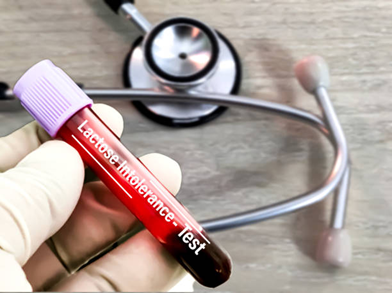Lactose Intolerance Test
Lactose intolerance is a common condition affecting many individuals, causing symptoms like bloating, diarrhea, and stomach cramps after consuming dairy products. If you have noticed discomfort after eating dairy or suspect that your body can’t digest milk properly, a lactose intolerance test may be the solution. Dr. Ksheetij Kothari, a skilled gastroenterologist in Pune, specializes in diagnosing and treating digestive health issues like lactose malabsorption and dairy intolerance. With his expertise and experience, patients can expect a thorough evaluation and clear, actionable insights regarding their condition.
What is a Lactose Intolerance Test?
A lactose intolerance test is a medical procedure used to assess whether your body has trouble digesting lactose, a sugar found in milk and dairy products. It helps to identify lactose malabsorption, where the body does not produce enough lactase, the enzyme needed to break down lactose. This test plays a key role in understanding symptoms such as bloating, gas, and stomach discomfort, which are commonly associated with the condition.

Benefits of Lactose Intolerance Test
- Accurate diagnosis: Helps identify if lactose intolerance is the cause of digestive discomfort.
- Improved digestive health: Provides clarity on how to manage symptoms and improve gut health.
- Customized treatment: Enables a tailored approach to diet and lifestyle for better symptom management.
- Non-invasive: The test is relatively simple, safe, and does not require surgery.
- Prevents misdiagnosis: Distinguishes lactose intolerance from other digestive disorders with similar symptoms.
Who is Eligible for Lactose Intolerance Test?
Individuals with digestive symptoms: Those who experience bloating, gas, and cramps after consuming dairy.
Suspected lactose intolerance: People who suspect they have difficulty digesting milk or dairy products.
Anyone with a family history: If there’s a family history of lactose intolerance or similar digestive disorders.
Chronic digestive health issues: If you’ve struggled with ongoing digestive health concerns that might be linked to dairy intolerance.

How Does Lactose Intolerance Test Work?
The test works by assessing how well your body can break down lactose. There are two primary types of tests:
- Hydrogen Breath Test: After consuming a lactose solution, your breath is analyzed for hydrogen. Increased hydrogen levels indicate that lactose is not being properly absorbed.
- Lactose Tolerance Test: Blood samples are taken after consuming lactose to check for changes in blood sugar levels. A lack of increase in blood sugar suggests lactose intolerance.
How to Prepare for Lactose Intolerance Test
- Fasting: You will likely need to fast for at least 8 hours before the test.
- Avoid certain foods: You may be asked to avoid dairy and other foods that could interfere with the results for a day before the test.
- Medications: Inform your healthcare provider about any medications you are taking, as they could affect the test outcomes.
- Hydration: Drink plenty of water beforehand, but avoid consuming any drinks that might contain sugar or artificial sweeteners.
Procedure for the Test
- Initial consultation: Your doctor may ask about your symptoms and medical history.
- Consuming lactose solution: Depending on the test, you will either drink a lactose solution or receive a dose of lactose.
- Sample collection: For the hydrogen breath test, breath samples will be collected at regular intervals. For the lactose tolerance test, blood samples will be taken.
- Post-test monitoring: You may be asked to wait for a while to ensure accurate readings.
- Results processing: Your doctor will analyze the results and discuss the diagnosis with you.
How Long Is the Test?
The entire procedure generally takes between 30 minutes to 2 hours, depending on the type of test and how many samples need to be collected. Results are usually available within a few days, after which your doctor will discuss the findings with you.
Cost of Lactose Intolerance Test in Pune
The cost of a lactose intolerance test in Pune can vary based on factors such as the clinic and the type of test conducted. Prices usually depend on the specific diagnostic method chosen, with some tests being more comprehensive than others. It is advisable to check with the healthcare provider for accurate pricing and to confirm if there are any additional charges or services included with the test.
Results and Accuracy
Test results for lactose intolerance are usually available within 1 to 3 days. The accuracy of the test depends on several factors, including your preparation and the specific method used. Hydrogen breath tests and lactose tolerance tests are highly reliable, though it’s essential to follow pre-test instructions carefully for the best results.

